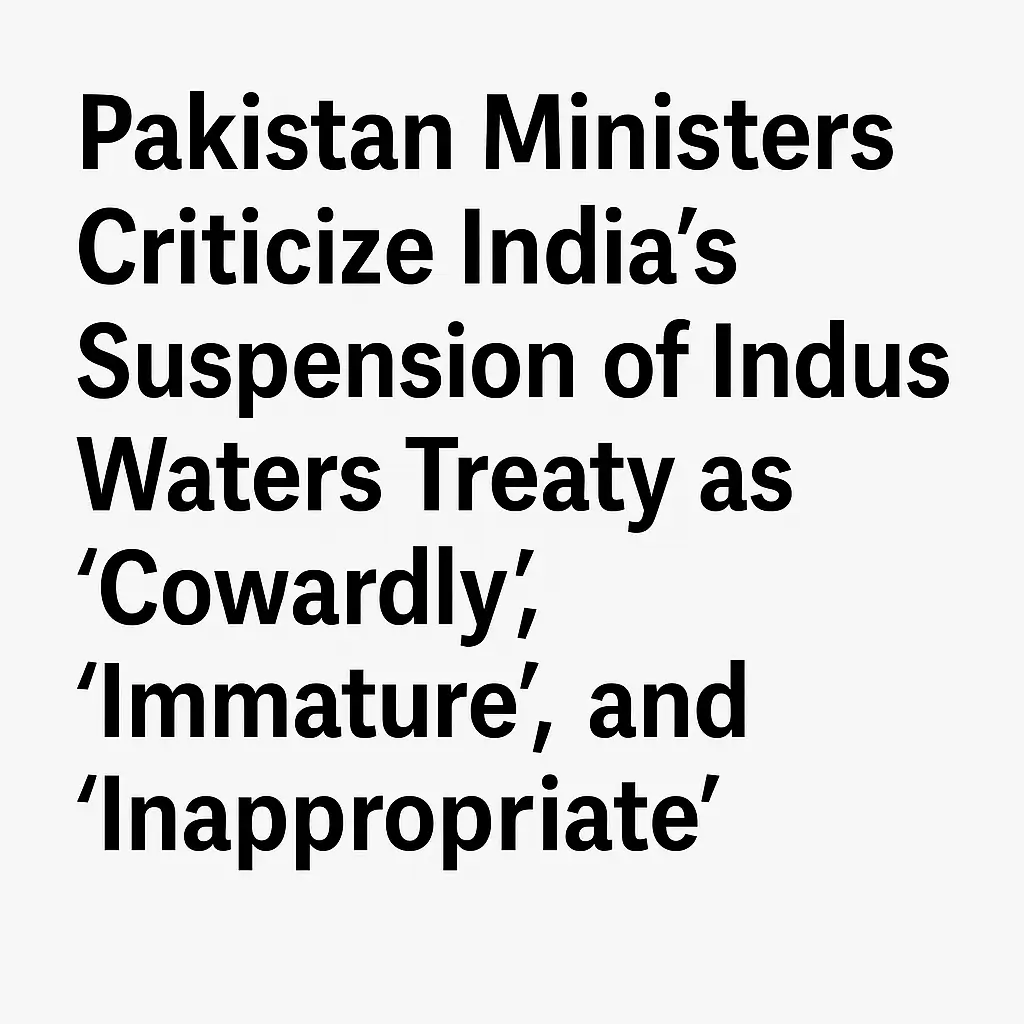The ongoing tension between India and Pakistan has taken another sharp turn, with Pakistan’s ministers vocally criticizing India’s recent suspension of the Indus Waters Treaty. The move has sparked heated debates, as both sides continue to navigate the complex relationship surrounding the shared Indus River system.
What is the Indus Waters Treaty?
The Indus Waters Treaty, signed in 1960 under the auspices of the World Bank, is a landmark agreement that governs the use of the waters of the Indus River and its tributaries by India and Pakistan. The treaty allocated the waters of the six rivers of the Indus basin between the two nations, with India receiving control over the eastern rivers (Ravi, Beas, and Sutlej) and Pakistan gaining control of the western rivers (Indus, Jhelum, and Chenab). The treaty was hailed as a significant achievement in water-sharing diplomacy and was designed to prevent water disputes from escalating into full-scale conflicts.
India’s Suspension of the Indus Waters Treaty
India’s recent decision to suspend the Indus Waters Treaty has sent shockwaves across the region, with many political analysts and experts describing the move as a drastic escalation in the already fragile bilateral relations between the two nations. India’s government cited concerns over the use of water resources in Pakistani-controlled regions of Jammu and Kashmir, which it claims are underutilized by Pakistan.
The suspension of the treaty is also viewed by India as a response to what it perceives as Pakistan’s inability to implement necessary safeguards and water management systems in the region. The Indian government argues that Pakistan has not honored the terms of the treaty, particularly in terms of water distribution and management.
Pakistan’s Strong Response
Pakistani ministers have vehemently criticized India’s move, with several describing the suspension as “cowardly,” “immature,” and “inappropriate.” Foreign Minister Shah Mahmood Qureshi, in a press statement, said that India’s decision undermines a treaty that has served as a foundation for cooperation between the two nations for decades. He called on the international community to hold India accountable for violating the treaty, stressing that the suspension could have devastating consequences for the millions of people who rely on the Indus River system for their livelihoods.
Qureshi was joined by other government officials who warned that India’s actions could have serious long-term consequences for both countries. Pakistan’s government expressed concerns about the potential for the move to destabilize the region and disrupt the delicate balance maintained by the treaty for more than 60 years.
Political and Environmental Implications
The suspension of the Indus Waters Treaty comes at a time when both India and Pakistan are dealing with complex political and environmental challenges. Climate change, population growth, and the increasing demand for water resources have placed immense pressure on the shared river system. The Indus Basin has long been one of the most heavily utilized water systems in the world, and tensions over water use have been a recurring issue.
In addition to the political ramifications, the suspension could also have significant environmental impacts. Water scarcity is a growing concern in both India and Pakistan, with large portions of the population dependent on the Indus River system for irrigation and drinking water. Any disruption in the flow of water or in the management of resources could exacerbate the already dire water crisis faced by both nations.
The Role of the International Community
The Indus Waters Treaty was seen as a model of cooperation in a region prone to conflict, and its suspension raises serious concerns about the future of international water-sharing agreements. The World Bank, which played a key role in brokering the treaty, has urged both countries to engage in dialogue and resolve their differences in a peaceful manner. International observers have called on both India and Pakistan to uphold their commitments to the treaty, stressing that water disputes should not be allowed to undermine regional stability and security.
Conclusion
India’s decision to suspend the Indus Waters Treaty has escalated tensions between the two nuclear-armed neighbors, with Pakistan’s ministers calling the move “cowardly,” “immature,” and “inappropriate.” As both countries face growing challenges related to water scarcity, climate change, and political instability, it is crucial for them to find common ground and prioritize cooperation over conflict. The international community must also play a proactive role in encouraging dialogue and ensuring that the Indus Waters Treaty remains a pillar of peace and stability in the region.

